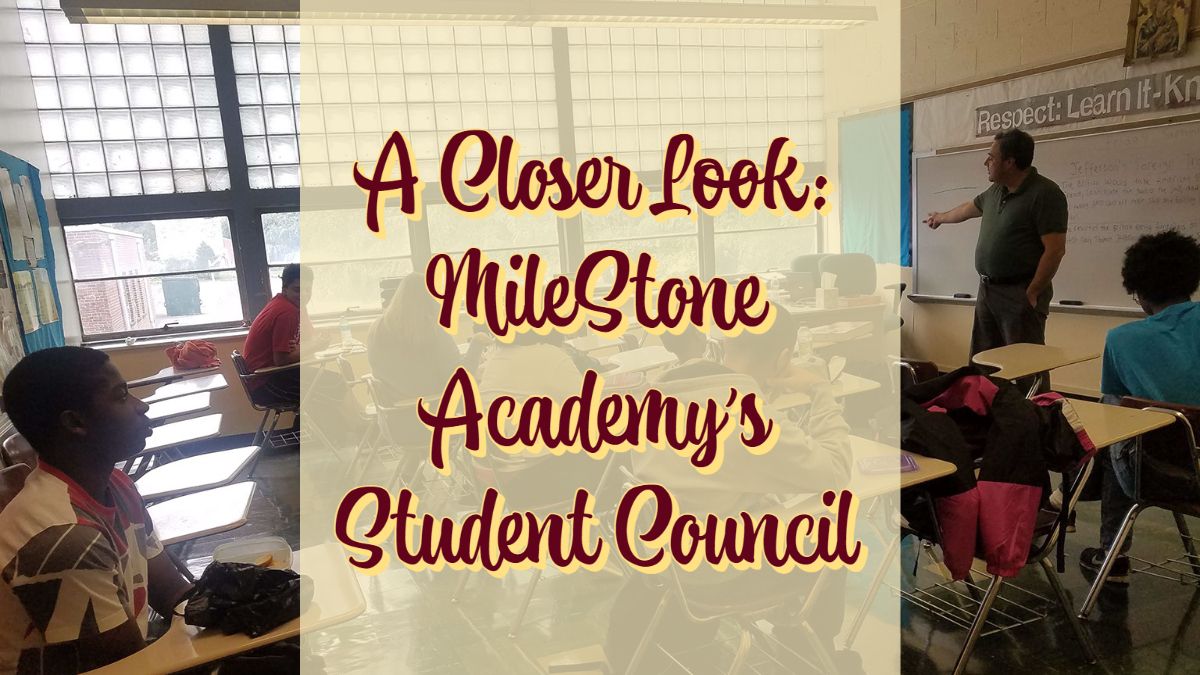
MileStone Academy’s Student Council
Recently, Jose, a current student at MileStone Academy inquired about starting a Student Council. Absolutely thrilled and curious, Mrs. Michele asked students to present his reasons as to why MileStone should start a Student Council and how the group will function. Of course, they did an amazing job and here is what we have learned so far!
What is a Student Council?
A Student Council is a volunteer group of elected and students working together with adult advisors within the framework of a constitution or bylaws to provide a means for student expression, socialization, and help in school affairs and activities.
What is the purpose of a Student Council?
Typically, the Student Council purpose is to give opportunities for student experience in leadership and encourage student / faculty / community relations.
How does the Student Council function?
The student council helps share ideas, interests, and concerns with teachers and institute administrative authorities. It also helps raise funds for school-wide activities, including social events, community projects, helping people in need and school reform. Most schools take part in food drives, fundraisers, and parties. Council members learn skills that were an extension of their formal education.
An example of the structure of a high school student council may include a president, a vice president, secretary, treasurer, sergeant of arms, fundraising officer, historian, boys’ rep, girls rep, and just members. These roles may be assigned or voted on, either within the student council or by the entire student body. They may also reflect descending grade-levels, with the president in the oldest grade, and so forth.
Secondary school governments often have more independence and power than younger governments. Often a student government is overseen by a sponsor, which is usually a teacher at that school. Compared to elementary school councils, junior high and high school councils generally have fewer people.
In some schools, a student council representative is assigned to each class. That person passes on requests, ideas and complaints from students in that class to the student council. In other schools, the elected Class Officers are automatically members of the student council.
What are some benefits of having a Student Council?
There are endless reasons why your school should have a student council, but we had to narrow it down to the top ten most important to MileStone students:
-
Excellent Experience to Reference
Leadership looks good. It does not matter if you are applying to a job or college, showing that you have leadership skills helps you to stand out among the crowd. This is important when everyone around you is fighting for a spot at your desired job or trade school. You want to make your skills stand out and student council can do this. It also shows colleges and employers that you have determination, grit and know how to get things done. And they love that!
-
Learn About Politics
Some kids dream of being the president of the United States of America. Student council can be your first step. By joining student council, you are going to learn all about the election process. Not only will you create slogans, election material and write speeches, you will begin to understand where you stand on important issues in your community and school. Once you enter student council, you will gain experience with working with a team and professional documents. You will learn to look beyond homework and exams and see how the skills that you are learning might be applied to the real-world as you network with other like-minded teens that want to make a difference.
One very important skill a student learns from a Student Council is public speaking! Glossophobia, or a fear of public speaking, is a very common phobia and one that is believed to affect up to 75% of the population. Some individuals may feel a slight nervousness at the very thought of public speaking, while others experience full-on panic and fear. Teach students to conquer the fear of public speaking early on through a platform exclusively for them and their peers.
-
Develop People Skills
Being a leader is all about getting the hearts of the people. Student council teaches you about yourself and how you interact with people. Not only will students refine their communication and teamwork skills, but they will also begin to understand how attitude is important. As advisors talk with individual students and large groups or community professionals, they will learn effective communication, debate, and persuasion skills. Your dedication and commitment to your projects and improving your school will also begin to shine. Push this to the max by making sure you talk to everyone. Become a leader among your student council. Who knows, your award-winning personality might be what lands you a place at your dream job or post high school training.
-
Gain Managerial Experience
You are not a lone ranger in this journey. Council members will connect with others outside of their school and community and work with other council members to make things happen. This not only teaches everyone about working together and how getting other’s opinions is important but gives you management and leadership experience.
On some projects, advisors might need to take the wheel, while for others you sit back and supply guidance. For example, you might choose to head an after-school program for your community, or you might offer guidance as a group to change your school from using Styrofoam plates at lunch to reusable ones. Whatever the situation, everyone learns to be a leader and stand up for student bodies rights to improve your school and community. Make sure you get the most out of this by not just going with the flow. Your opinions matter and are important so voice them.
-
Networking and Outreach Opportunities
Student councils work to improve their schools, but it goes beyond that. Through donating your time to a charity in your community or hosting a charity event at your school, you will begin to see how you can change society. By learning how to sponsor events, business knowledge is gained. It also teaches you where your personal goals lie and what is important to you. The reward that you can feel from helping others in your community might expand to finding ways to help other communities. Through this, you will also network with students that are outside of your community and home, which can create memories and experiences that you might not have otherwise gotten.
-
Learn About Yourself
Your time as a council member is important. While you can sit back and do the least amount possible to get that shining mark on your college application, only through pushing yourself will you see the true rewards of this association. Therefore, to get the most of benefits, you need to step out of your bubble and try the things that are difficult. For example, run for president of your council or take on that spirit week project. You never know the valuable life skills that you might learn. Most important be the voice of your student body, share your opinions, be confident, have humility and fight for causes that are important.
-
Work as a Team
Knowing how to work well with a team is an essential skill for any career. Being in a student organization teaches you how to do this by putting you in situations where you must take advice from others, as well as give your own.
Joining a student organization helps to build your network & can provide valuable skills.
In conclusion, student organizations have a lot to offer. Whether you join as a member or choose to lead one, simply taking part in an extracurricular group will enhance your school experience.
Gaining skills, making connections, and broadening your knowledge through a student organization will help you become a more well-rounded individual — one that’s ready to take on their future career!


